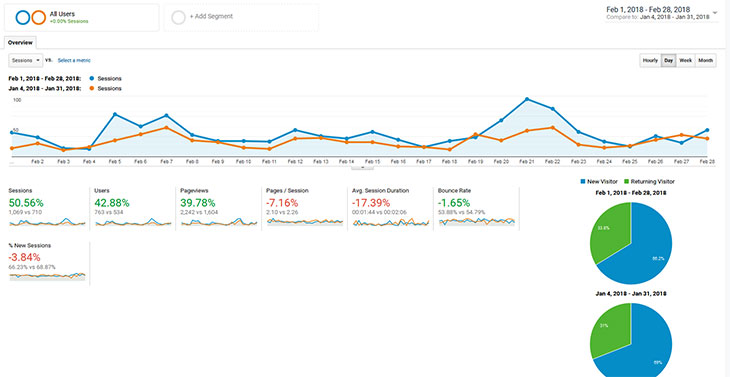
SEO reports are vital for every business. Every business wants to learn from time to time, the performance of their SEO campaigns.
Every SEO agency must read what follows in this blog post. Simple Intelligent Systems has come up with some critical metrics that should be incorporated in an SEO report and the method of using them.
What is an SEO report?
A good SEO report should cover the following questions related to the clients’ goals asked by an SEO agency before compiling it and forwarding it to the client.
- Does the client intend to boost his online traffic?
- Does the client aim to rank for a particular keyword, and if yes, which keyword is that?
- Does the client aim to achieve higher sales, and if yes, how more revenue is desired?
Asking such questions is always helpful. An SEO report that answers all these questions provides a picture of the success or failure of the entire SEO campaign. A client can thus make sound decisions regarding the improvements to be made in the campaign. He can direct his resources towards what is necessary for the success of his business goals.
Let us review some important metrics that matter in an SEO report.
1. Channels of traffic.
This metric should form a part of the beginning of an SEO report if the client aims to increase the online traffic for his website.
More specific information about the source or Medium of the traffic would give an insight into the more lucrative areas of investing the resources.
2. Rate of conversion
Conversions are all that matters for the success of your website. You can have an astonishing design, have millions of visitors clicking every minute, but what if they are not converting? — The entire campaign is a futile exercise.
So this metric forms the essential part of an SEO report and should be attached to its front page. Other reports will depend on this report.
3. Total number of Organic Clicks
You need to have explicit knowledge of the sources from where you are receiving organic traffic. When a visitor lands on your website directly from the SERP, then this is organic traffic.
Organic clicks should form a part of your SEO report for the following reasons
- Organic clicks bring in highly qualified prospects.
- They fetch sustainable results.
- The organic search proves to be cost-effective in the long run.
- Organic clicks give you an edge over your competitors.
- Organic searches are from your regular and more engaged customers.
- They help in brand-building.
- Organic clicks bring in more credibility.
In the Search Console, navigate to Performance
You will get a report that will brief you about the number of clicks you received on your site and from which search queries.
4. Goal completion metric
All SEO campaigns are triggered for the success of certain business goals and objectives.
Some of your business objectives can be:
- To Create Brand awareness
- to Acquire customers
- To Increase sales
- To Generate leads
- To Increase the engagement of visitors.
You can use Google Analytics to analyze the completion of your goals.
Conversions>Goals>Overview will get you to your goal completion report.
5. Page-Level Traffic
It is not only essential to know the source of traffic but also equally imperative to understand where they landed. For example, your visitors liked a particular blog post on your web page. This information is critical as it suggests the interest areas of your customer. This metric helps you focus on the areas that are visited more by potential customers. So this metric is an essential ingredient of your SEO report.
Use Google Analytics to get there. Behavior > Site Content > Landing Pages will give you details of your page-level traffic
6. Page Speed Insights
Page Speed is another critical metric of SEO and should be incorporated in your report. If your pages take time to load, you can lose potential customers, and all your goals will go unaccomplished.
The free SEO tool Google Page Insights can help you gain insight into the Page Speed.
This tool reports the speed of your web pages and suggests measures for improvement.
7. Time on site and Bounce Rate
This metric is vital for your success, as you can judge how engaging your site’s content is. If people are finding the content uninteresting, they will leave your website within the first ten seconds. Otherwise, they are likely to stay on longer. So you need to form this metric a part of your SEO report.
8. Rankings and Links
While most agencies rank websites for specific keywords, the SEO report should indicate ranking as an overall performance rather than just a single criterion.
There are plenty of tools that help you identify the links that you are gaining and the ones that you are losing.
If a particular page on your competitor’s site is gaining a lot of links, you can create a similar page with similar content. Thus you can have the edge over your rivals in business.
9. Recommendation section and Execution Plan
It is always wise to have a recommendation section at the end of every SEO Report. This section will help you to rectify the current problem areas and pave the way for the progressive growth of your business.
This recommendation section will be of great worth because it sets your vision in the right direction by furnishing actionable strategies for your SEO data.
Review your report finally
Before forwarding the monthly SEO report to your client, review it thoroughly to ensure you furnish the correct statistics. A slight error can turn the entire SEO game upside down.
You must check the following:
- Does your report clearly outline the metrics you are working on and how it is benefitting the business?
- Is your report easy to comprehend?
Consider this report from the client’s perspective, and you will prepare a concrete report for your client.
I hope this blog provided you with valuable insight into your SEO mission and reporting metrics. Simple Intelligent Systems will be happy to help you with any further queries from you.
Please click here to contact us with your questions and feedback.







